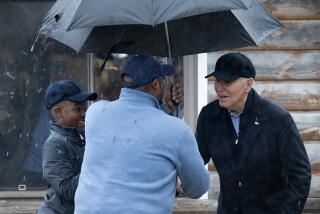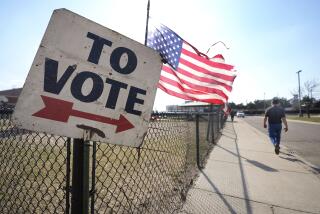Running on one issue: Michigan’s economy
. -- Michigan takes its turn today as a presidential primary battleground after a week of sharpening arguments by Republican contenders over how to revive a state laid low by disappearing auto factories and jobs.
With only the Republican primary a contest of consequence because of an earlier withdrawal by most of the Democratic contenders, the GOP’s leading rivals have carefully tweaked their campaign messages to emphasize economic concerns.
The two candidates with the most at stake in Michigan’s primary, Sen. John McCain of Arizona and former Massachusetts Gov. Mitt Romney, have sniped at each other over the last several days over how best to cure Michigan’s ills -- and in the process, shed some light on how they might tackle signs of a looming national recession.
McCain is trying to build on his comeback win in New Hampshire. For Romney, a loss in his birth state could be crippling after defeats in Iowa and New Hampshire.
While McCain has taken a blunt economic tack, warning that some jobs “are not coming back” and stressing job retraining and new business opportunities, Romney has hewed to a sunnier insistence that old industries can be restored.
“The pessimists are wrong,” Romney told the Detroit Economic Club on Monday. “The auto industry and all its jobs do not have to be lost.”
Even former Arkansas Gov. Mike Huckabee, who has campaigned more in Michigan in recent days than he was expected to, has broadened his appeal to evangelical religious voters with a conservative pitch to replace the federal income tax with a “fair” national retail sales tax.
Some economic experts here question whether any of the Republican solutions would have a real effect on a state that was once the center of the world’s automobile industry but now struggles with an unemployment rate of 7.4%, the worst in the nation.
Even McCain’s effort at realism -- which he drew back from Monday with more hopeful comments -- does not reckon with the grim scale of Michigan’s plight, economists said.
“It’s real bad,” said Donald R. Grimes, a University of Michigan economic researcher and a moderate Republican. “All the people who talk about a one-state recession, I think they have understated the depths of the economy. I would have used the word ‘depression.’ I believe this is worse than anything we experienced in the 1930s in terms of the length of time the state has been going down.”
Detroit and smaller factory towns across southeastern Michigan have been ravaged by plant shutdowns and the layoffs of nearly half a million workers since the mid-1980s. In places such as Flint and Pontiac, massive old auto plants have become ghost dumps, abandoned to decay.
Adding to the state’s stark economic portrait, growing numbers of unemployed Michigan workers have fled to other states. Since July 2006, the state’s population has dropped by 30,000, said Charles L. Ballard, a Michigan State University economics professor.
“I understand the rhetorical approach Gov. Romney’s trying, but he’s just wrong,” Ballard said. “Sen. McCain is speaking to the realities, but I’m not sure if he even understands how perilous it is.”
Parts of the Detroit area are reeling from the housing foreclosure woes that have led to massive banking losses on Wall Street and raised fears about a nationwide recession.
Macomb County, a northern suburb that once led the state in housing starts, “has now done a 180 and leads in foreclosures,” said James Carabelli, the county’s GOP chairman and a Romney supporter.
But as Romney, McCain and Huckabee have crossed the state from Detroit’s sparsely populated downtown to the thriving western Michigan communities of Grand Rapids and Holland, the rivals have concentrated more on Michigan’s devastated industrial landscape than on America’s looming banking crisis and whispers of recession.
During his speech in Detroit on Monday, Romney made a slight linkage between the two economic crises. “If we are going to be the world’s greatest economic power,” he said, “we must invest in our future.”
He promised a “fivefold increase -- from $4 billion to $20 billion -- in our national investment in energy research, fuel technology, materials science and automotive technology.”
But mostly, Romney talked about rebuilding the auto industry and forcing Washington to “stop loading Detroit down with unfunded mandates” that “kill competitiveness.”
McCain, who warned last week about factory jobs that would never return, chimed in Monday with his own appreciation for Detroit’s glory years. He promised to “regain Michigan’s position as the best in the world. We will create new jobs.”
But later on his campaign bus, McCain questioned Romney’s ability to deliver, saying: “If he claims he creates jobs, he didn’t while he was governor of Massachusetts.”
Candidates who promise that Washington can transform a shrinking industrial base are simply off-base, Grimes said.
“The manufacturing jobs and the auto industry are gone and they are never coming back,” Grimes said. “I’ve seen both Huckabee and Romney make comments about letting people believe they can somehow change Washington and bring back some of those manufacturing jobs. That’s ludicrous, and it’s doing a disservice to the residents of Michigan.”
But some Republican voters who ventured out in light snow Monday to see their favorites still held out hope. Elizabeth Fenstermaker, who attended a McCain event with her husband and their two children, said the family worried constantly that they would have to move to another part of the country where jobs were more secure.
“Everything is connected, it seems like in Michigan, so when one huge industry that our state relied on was plummeting, it affects everything else,” said Fenstermaker, 29, who lives in Otsego. One byproduct of the auto industry’s decline, she said, is fewer orders at the furniture company where her husband works. She worries about his job if the decline continues.
“[The economy] is huge,” she said, “especially for us.”
--
scott.martelle@latimes.com
Braun reported from Romulus and Martelle from Bloomfield Hills. Maeve Reston in Kalamazoo contributed to this report.
More to Read
Get the L.A. Times Politics newsletter
Deeply reported insights into legislation, politics and policy from Sacramento, Washington and beyond. In your inbox three times per week.
You may occasionally receive promotional content from the Los Angeles Times.







